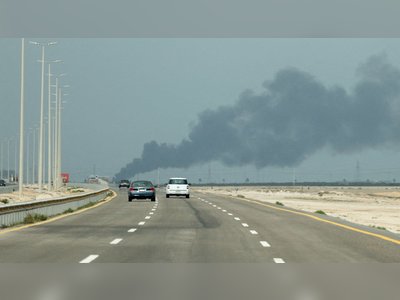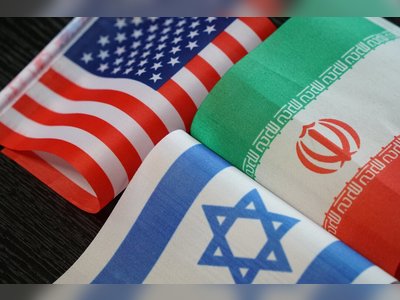
Hardly can a king have been better prepared after wait of lifetime
The King is a deep-thinking, spiritual man. In these uncertain times, we have an anchored monarch who — like his mother before him — cares deeply about those he serves: in Britain, the realms and Commonwealth.
He might have been born into a family of wealth and privilege but he has always done his best to justify that good fortune by working to improve the lot of others less fortunate. He would be the first to admit he is not perfect. Charles can be a little eccentric but he is a passionate, driven man who has a great admiration for the arts.
He loves Shakespeare — his favourite play is Henry V — he is a fan of radio comedy The Goon Show, the poetry of Dylan Thomas, the music of Bach and Leonard Cohen and the architecture of Rome, Sir Christopher Wren and Quinlan Terry. Charles believes in harmony and how the natural world complements the human soul.
His journey from shy prince to our oldest monarch to be crowned is a truly remarkable one. He was born at 9.14pm on November 14, 1948, at Buckingham Palace, weighing 7lb 6oz. From an early age Charles shared a close bond with his sister, Princess Anne, who was born on August 15, 1950. They relied on each other for company when their parents were on overseas tours or carrying out royal duties. The two remained close into adulthood.
There is a decade between the birth of Anne and Prince Andrew, who was born on February 19, 1960. Charles spent part of his childhood at Hampshire school, Cheam, just like his father Prince Philip who had been a pupil there in the Thirties. On May 1, 1962 his father took him to his boarding school, Gordonstoun in Scotland, but Charles found aspects of his life there difficult. He had to contend with early-morning runs, cold showers, and bullying. He alluded to the German prisoner-of-war camp Colditz Castle when he called it “Colditz in kilts”.
The Queen and Philip’s family was complete with the birth of their fourth child, Prince Edward, on March 10, 1964. By then, the Queen had become more comfortable in her role and what was expected of her.
After a period of schooling in Australia, Charles went to Trinity College, Cambridge. Before his investiture as Prince of Wales, he threw himself into learning Welsh at Aberystwyth University. The ceremony at Caernarfon Castle, on July 1, 1969, was watched by a record television audience of 19 million.
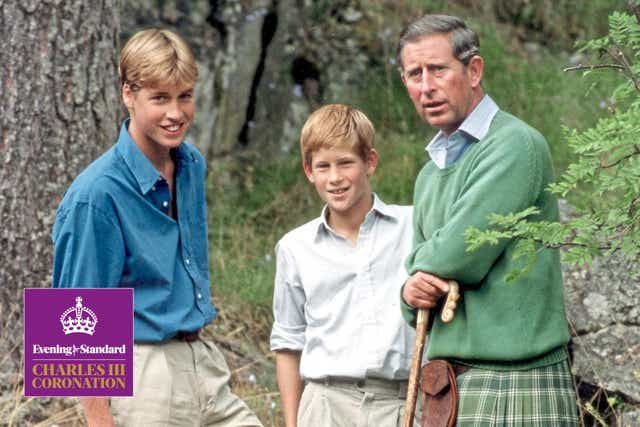
Family man: Charles with William and Harry in 1997
After graduating from Trinity College in 1970, Charles trained as a pilot at RAF Cranwell, before enrolling at the Royal Naval College in Dartmouth. He began his service on the destroyer HMS Norfolk in November 1971. The prince later qualified as a helicopter pilot and joined the 845 Naval Air Squadron on the aircraft carrier HMS Hermes. In February 1976, Charles commanded the coastal minesweeper HMS Bronington. He was promoted to the rank of commander and ended active service in the Royal Navy in 1977.
Charles first met the love of his life, the then Camilla Shand, in 1971 and they enjoyed a passionate romance. They resumed that affair after she married Andrew Parker Bowles and again after his marriage to Princess Diana had “irretrievably broken down”. He later told the Queen that Camilla’s position in his life was “non-negotiable”.
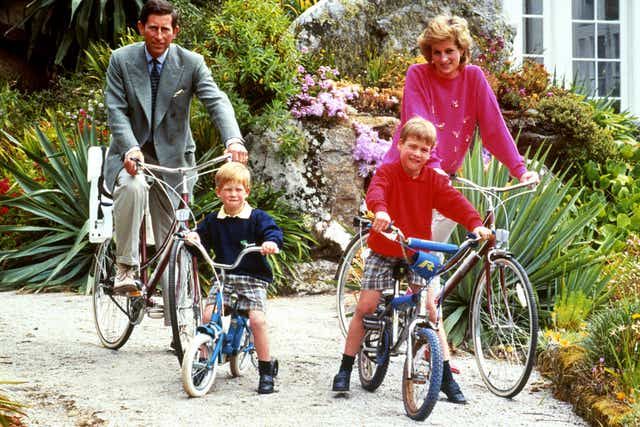
Charles and Diana with their sons during a holiday in the Scilly Isles
Torn between “the devil and the deep blue sea”, Charles proposed to Lady Diana Spencer on February 6, 1981. He was deeply unsure about the marriage as he believed they were incompatible and he wanted to call it off. But the wedding, described by the Archbishop of Canterbury, Robert Runcie, who officiated, as the “stuff of which fairy tales are made”, went ahead on July 29, 1981.
A global television audience of 750 million watched the wedding with around 600,000 people lining the route from the palace to St Paul’s. Almost exactly a year after their marriage, on July 9, 1982, Charles and Diana were delighted at the birth of their son, Prince William. But despite her smiles, the princess was struggling to cope both physically and mentally. Diana was expected to do her duty and join Charles on a gruelling tour of Australia and New Zealand. One of the most enduring moments was the “happy family” photo- shoot where baby William played with his parents on the lawn of Government House in Auckland. They had the heir. Now it was time for the so-called Spare.
Prince Harry was born on September 15, 1984. By this point the couple’s marriage was rocky. Diana had known for months that she was having a boy but had kept it from her husband. When they returned to Kensington Palace, Charles told her he was off to play polo at Windsor. Diana saw this as a sign of his uncaring attitude and said she felt abandoned. She later turned to Major James Hewitt for love and their five-year affair ended in 1991. During her notorious BBC Panorama interview in 1995, Diana admitted that she “loved” and “adored” Hewitt.
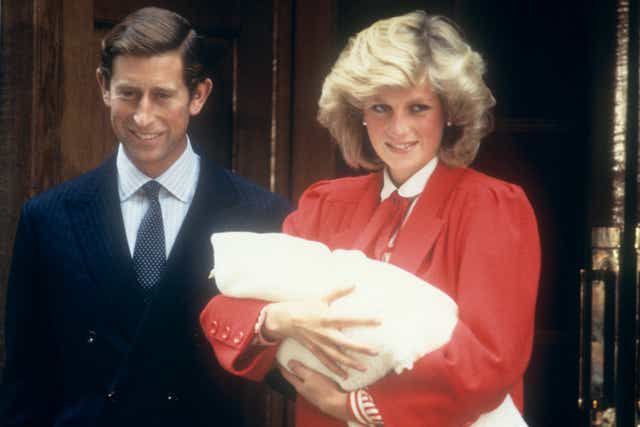 The then Prince and Princess of Wales, Charles and Diana, leaving hospital with Prince Harry
The then Prince and Princess of Wales, Charles and Diana, leaving hospital with Prince Harry
Touring India in February 1992, Princess Diana posed in front of the world’s greatest monument to love, the Taj Mahal in Jaipur. But Charles did not join her and attended a business function in Delhi. The photograph was published under the headline: “Temple of Loneliness”. On December 9, 1992, then prime minister John Major announced the formal separation of the Prince and Princess of Wales.
Buckingham Palace released a statement on December 21, 1995, saying the Queen had written to Charles and Diana urging them to divorce, which they agreed to do. When the divorce was finalised, it emerged that the princess would be stripped of the title Her Royal Highness. She would be known as Diana, Princess of Wales. It was agreed that the couple would have shared custody of the boys and she received a lump sum of £17 million as well as £400,000 a year.
What happened next rocked the monarchy. On August 31, 1997, the Princess of Wales was killed in a Paris car crash with new boyfriend Dodi Fayed.
Charles showed a great strength and compassion as a single father and he threw himself into the role. Harry, however, now questions his father’s suitability for parenthood, saying that he had an air of “never being quite ready for it”.
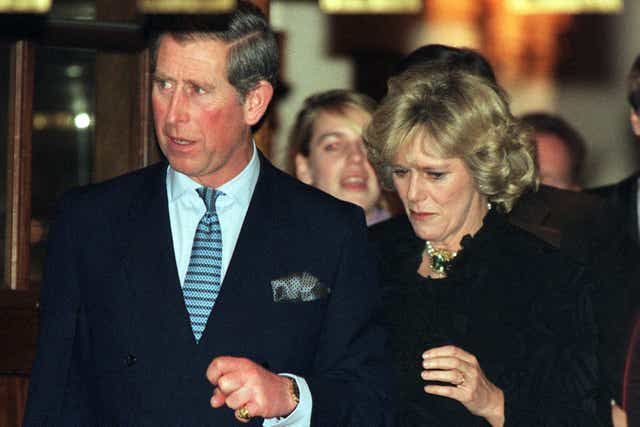
Charles never gave up on having Camilla at his side. He hired PR expert Mark Bolland to mastermind a campaign dubbed “Operation Mrs PB”, to secure enough public acceptance of her that a marriage would be possible.
Charles and Camilla married on April 9, 2005, when she became HRH the Duchess of Cornwall. They used their wedding to repent past deeds, as each had been involved in the break-up of the other’s marriage.
The couple chose the sternest possible prayer of penitence from the 1662 Book of Common Prayer to be read by themselves and their guests at the blessing of their marriage. Camilla has proved a tower of strength to His Majesty.
During the late Queen’s Platinum Jubilee celebrations last June, marking 70 years on the throne, Charles was loudly cheered when he publicly thanked her for her lifetime of “selfless service”.
Elizabeth died on September 8 at Balmoral. In his eloquent first televised address as King, he vowed to serve as his beloved mother had done, all his life. His pay-off line: “May flights of angels sing thee to thy rest” was a quote taken from Act V, Scene II of Shakespeare’s Hamlet. It was a mark of respect by Charles for the woman who had been his guiding light, which had now been extinguished.
At 11am on September 19, the Queen’s state funeral was held at Westminster Abbey. Charles was formally proclaimed monarch at an accession council in an ancient ceremony at St James’s Palace, which was televised for the first time.
Comments











